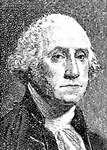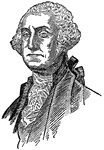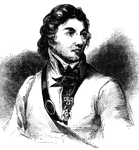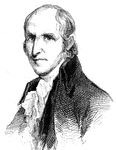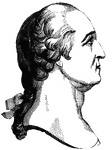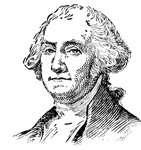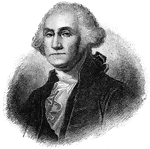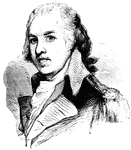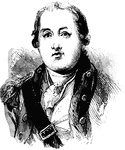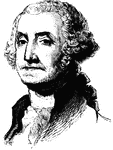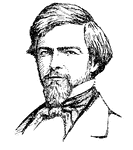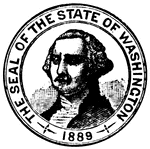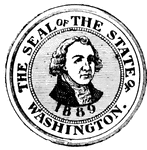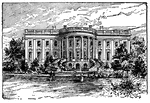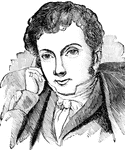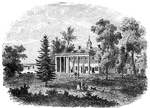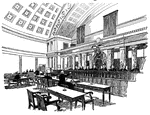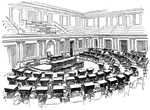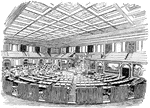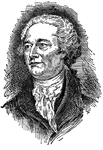
Alexander Hamilton
(1757 - 1804) Secretary of the Treasury, founder of the Federalist Party, an influential delegate to…
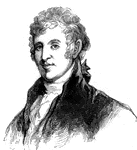
Colonel David Humphreys
(1753- ) Aid to Washington, colonel, and American ambassador to Portugal and Spain.
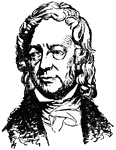
Washington Allston
(1779-1843) American Romantic painter who studied under Benjamin West and taught Samuel F.B. Morse.…
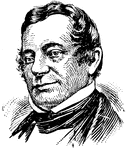
Washington Irving
(1783-1859) American writer who wrote a collection of children's stories that included Rip van Winkle…
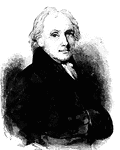
Reverend Mason L. Weems
(1759-1825) Clergyman that wrote the first biography of President George Washington

Mary Phillipse
(1370-1825) George Washington's first love who was one of the only women to be accused of Treason during…
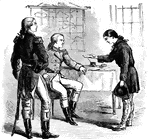
Deborah Simpson Presenting the Letter to General Washington
Woman who masqueraded as a male soldier presenting a letter to General Washington.
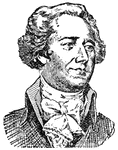
Alexander Hamilton
(1757-1804) Alexander Hamilton became captain of artillery at the beginning of the Revolution and was…

The Sixth regiment
Thousands of patriotic citizens filled every available space in the big railroad station in Jersey City…

Drilling Troops
The influx of Northern regiments of troops into Washington during the early days of the war rendered…

United States Arsenal at Charleston
At the time this picture was drawn the handsome arsenal of the government of Charleston, South Carolina,…
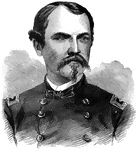
General W. W. Averill
"General Averill, born in Cameron, Steuben County, N. Y., November 5th, 1832, was graduated at the United…
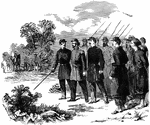
Major Taylor
"Escorting Major Taylor, of New Orleans, the bearer of a flag of truce, blindfolded, to the Confederate…

Great Bakery
"The Great Bakery for the United States Army at the Capitol, Washington, D. C.- sketched by our special…
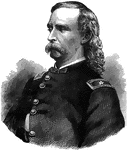
George Custer
"General George A. Custer, born in New Rumley, Harrison County, Ohio, December 5th, 1839, died in Montana,…
!["General Lorenzo Thomas, born in Newcastle, Del., October 26th, 1804, died in Washington, D. C., March 2nd, 1875, was graduated from the United States Military Academy in 1823; served in the Florida and Mexican Wars, and received the brevet of lieutenant colonel for gallantry at Monterey. On the 7th of May, 1861, he was brevetted brigadier general, and made adjutant general of the army on August 3rd, with the full rank of brigadier general. He served until 1863, when he was intrusted for two years with the organization of [African American] troops in the Southern States. He was brevetted major general, United States Army, on March 13th, 1865. He was retired in 1869." — Frank Leslie, 1896](https://etc.usf.edu/clipart/11000/11059/thomas_11059_mth.gif)
Lorenzo Thomas
"General Lorenzo Thomas, born in Newcastle, Del., October 26th, 1804, died in Washington, D. C., March…
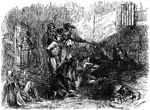
Prison
"The humors of a prison- scene in a station-house cell, Washington, D. C., after the appointment of…
New Jersey Troops
"The New Jersey troops crossing the Chesapeake Bay, in sixteen propellers, on their way to Washington,…

Burning of the White House
"Burning of the White House- the Federal troops, by command of General McClellan, abandoning their position…
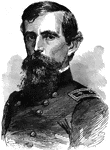
Lewis Wallace
"General Lewis Wallace, born in Brookville, Frankly County, Ind., April 10th, 1827, served in the Mexican…
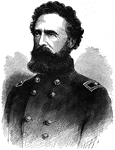
George Sykes
"General George Sykes, born in Dover, Del., October 9th, 1822, died in Brownsville, Texas, February…

Military authorities
"The military authorities at Washington, D. C., examining passes in 1861. This scene was of frequent…
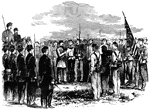
Seventy-ninth Regiment
"Taking away the colors of the Seventy-ninth New York Regiment for insubordination and mutiny, Washington,…

Zouaves
"Encampment of Colonel Ellsworth's New York Fire Zuoaves, on the heights opposite the Navy Yard, Washington,…
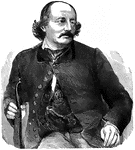
General Benjamin F. Butler
"General Butler was born in Deerfield, N. H., November 6th, 1818. At the time of President Lincoln's…
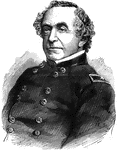
General Joseph G. Totten
"General Totten, born in New Haven, Conn., August 23rd, 1788, died in Washington, D. C., April 23rd,…

General David Hunter
"General Hunter, born in Washington, D. C., July 21st, 1802, died there, February 2nd, 1886, was graduated…
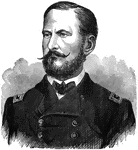
General Alfred Pleasonton
"General Pleasonton, born in Washington, D. C., June 7th, 1824, was graduated at the United States Military…
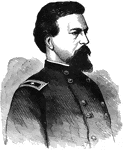
General Alexander S. Webb
"General Webb, born in New York city, February 15th, 1835, was graduated from the United States Military…
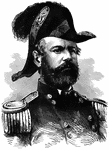
General Fitzjohn Porter
"General Porter, born at Portsmouth, N. H., June 13th, 1822, was graduated from the United States Military…

Fort Runyon
"Section of Fort Runyon, Va., guarding the road to Alexandria, occupied by the Twenty-first Regiment,…
